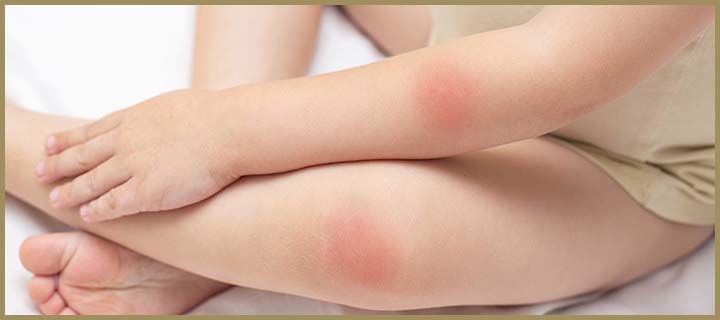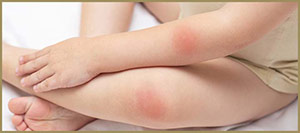Pediatric Allergy Solutions for Persistent Skin Rashes in Suffern, NY and Monroe, NY
Managing persistent skin rashes in children requires specialized care and a thorough approach. At Allergy & Asthma Care Rockland, Dr. Joel H. Selter and our experienced team focus on diagnosing and treating pediatric allergies that contribute to chronic skin conditions. We offer personalized treatment plans to identify triggers, provide effective relief, and improve your child’s skin health. For expert care and tailored solutions, contact us or book an appointment online today. We have convenient locations to serve you in Suffern, NY, and Monroe, NY.


Table of Contents:
What are the most common causes of persistent skin rashes in children?
Can food allergies lead to skin rashes in children?
Are there specific skin care routines recommended for children with allergies?
Can pollen and seasonal allergies cause skin reactions in children?
Persistent skin rashes in children are often caused by a variety of factors, ranging from allergies and infections to environmental irritants and underlying conditions. Understanding the most common causes can help parents seek timely care and ensure effective treatment for their child’s skin health.
● Eczema (Atopic Dermatitis): Often linked to genetics and allergies, characterized by dry, itchy skin.
● Contact Dermatitis: Triggered by exposure to irritants or allergens, resulting in a localized rash.
● Heat Rash (Prickly Heat): Occurs in hot, humid conditions due to blocked sweat ducts.
● Fungal Infections: Includes conditions like ringworm, presenting as itchy, ring-shaped patches.
● Bacterial Infections: Impetigo is a common example, marked by red sores that can crust over.
● Viral Infections: Such as chickenpox, which causes rashes and may include fever.
● Psoriasis: An autoimmune condition causing scaly, itchy patches, though less common in children.
● Seborrheic Dermatitis: Affects oily areas like the scalp, causing red, scaly patches.
● Tinea Versicolor: Fungal infection leading to discolored patches, often spread through direct contact.
● Allergic Reactions: Foods or medications can cause widespread rashes, sometimes with severe symptoms.
● Scabies: Caused by mites, resulting in intense itching and a characteristic linear rash.
● Hives (Urticaria): Sudden, itchy welts often due to allergies, stress, or infections.
Persistent rashes should always be evaluated by a healthcare professional to determine the underlying cause and appropriate treatment. This is particularly important if the rash is accompanied by other symptoms such as fever, swelling, or difficulty breathing. Early diagnosis and intervention can prevent complications and provide relief for the child.
Food allergies are a common cause of skin rashes in children, often manifesting as hives, eczema, or other forms of irritation. When the immune system reacts to certain foods, it can trigger an inflammatory response, resulting in visible skin symptoms alongside other potential allergic reactions. Identifying and managing food allergies early is key to minimizing these effects and ensuring the child’s overall well-being.
● Diagnosis: Proper diagnosis involves tools like skin prick tests, blood tests, or elimination diets to pinpoint specific food allergens. Accurate identification is essential for effective management.
● Management: Avoiding allergenic foods is the primary approach, complemented by an action plan for accidental exposure, including the use of antihistamines or an epinephrine auto-injector for severe reactions.
● Monitoring: Regularly tracking symptoms and consulting healthcare providers helps adjust dietary plans and treatment, as food allergies can change over time.
● Education: Teaching the child, family members, and caregivers about the allergy ensures safety in various settings, such as school or social activities.
● Skin Care: For skin conditions linked to food allergies, like eczema, using gentle, hypoallergenic skincare products and maintaining a routine can help manage symptoms and prevent flare-ups.
By collaborating with healthcare providers and staying informed, parents can effectively manage food allergies, reducing the risk of skin rashes and improving their child’s quality of life.
Children with allergies often have sensitive skin, making a gentle and consistent skincare routine essential for managing symptoms and preventing flare-ups. Proper care can reduce discomfort, improve skin health, and act as a protective barrier against potential allergens. Below are some recommendations to ensure the best care for children with allergy-prone skin.
● Gentle Cleansing: Use lukewarm water and mild, fragrance-free, hypoallergenic cleansers. Avoid harsh scrubs and pat the skin dry gently instead of rubbing.
● Moisturizing: Apply a thick, fragrance-free moisturizer immediately after bathing to lock in moisture. Opt for ointments or creams with ceramides for better hydration compared to lotions. Reapply moisturizers as needed, especially after water exposure.
● Bathing Routine: Keep baths or showers brief, lasting 5–15 minutes, and use lukewarm water. Avoid hot water and scented products; soothing baths with oatmeal or baking soda can help reduce irritation.
● Avoiding Triggers: Identify and avoid known allergens like specific fabrics or laundry detergents. Use fragrance-free laundry products to minimize skin irritation.
● Barrier Protection: Apply barrier creams or ointments to rash-prone areas, especially during dry weather or allergen exposure. Products with petroleum jelly or zinc oxide provide effective protection.
● Sun Protection: Choose a mineral-based sunscreen with SPF 30+ that is fragrance-free and hypoallergenic. Reapply sunscreen every two hours or as needed.
● Clothing and Bedding: Opt for soft, breathable fabrics like cotton or bamboo, avoiding wool and synthetic materials. Wash bedding regularly with hypoallergenic detergents to remove allergens.
Establishing a tailored skincare routine for children with allergies can help maintain healthy skin, reduce irritation, and prevent allergic reactions. Working with a healthcare provider ensures that routines are customized to meet the child’s specific needs.
Pollen and seasonal allergies can affect more than just the respiratory system; they can also trigger various skin reactions in children. These reactions occur when the immune system overreacts to allergens, releasing histamines that cause inflammation and irritation. While skin symptoms are often mild, they can still cause discomfort and impact a child’s daily activities. Understanding the types of skin reactions linked to seasonal allergies helps parents manage these symptoms effectively.
● Atopic Dermatitis (Eczema): Children with allergic tendencies may experience eczema flare-ups, which present as red, itchy, and inflamed patches on the skin.
● Hives (Urticaria): These are transient, raised, and itchy welts that can appear on the skin as a reaction to allergens such as pollen.
● Allergic Contact Dermatitis: Direct contact with pollen or other allergens can lead to localized skin redness and itching.
● Generalized Itchiness: Children might experience widespread itchiness during allergy seasons due to the body’s release of histamines, even if no visible rash is present.
While most skin reactions to pollen and seasonal allergies are mild, there are rare but more severe responses that can occur:
● Anaphylaxis: This is a potentially life-threatening reaction that can cause swelling of the face, throat, and airways, requiring immediate medical attention.
● Stevens-Johnson Syndrome: A rare but serious condition causing blistering and peeling of the skin, necessitating urgent medical care.
If your child shows signs of skin reactions possibly linked to allergies, consulting a pediatrician or allergist is essential. They can accurately determine the cause and suggest suitable treatments, such as antihistamines or topical creams, to alleviate symptoms.
It is also crucial to rule out any other underlying conditions through professional medical evaluation. Contact us or book an appointment online today to learn more about our food allergist services. We serve patients from Suffern NY, Monroe NY, New City NY, Spring Valley NY, Monsey NY, Airmont NY and Mahwah NJ.

Additional Family Care Services You May Need

Additional Family Care Services You May Need





